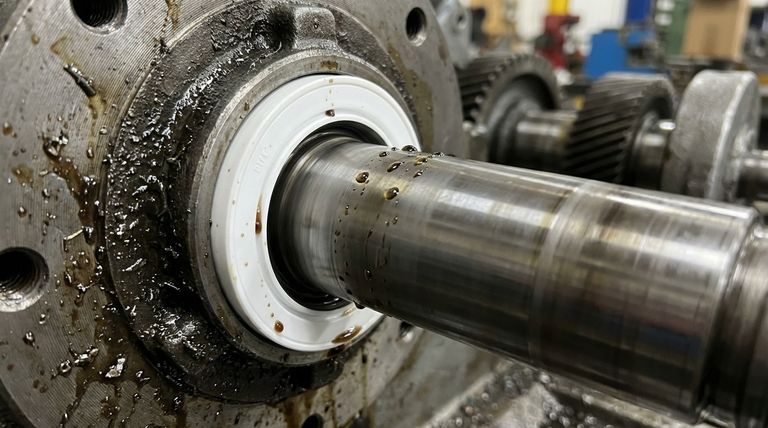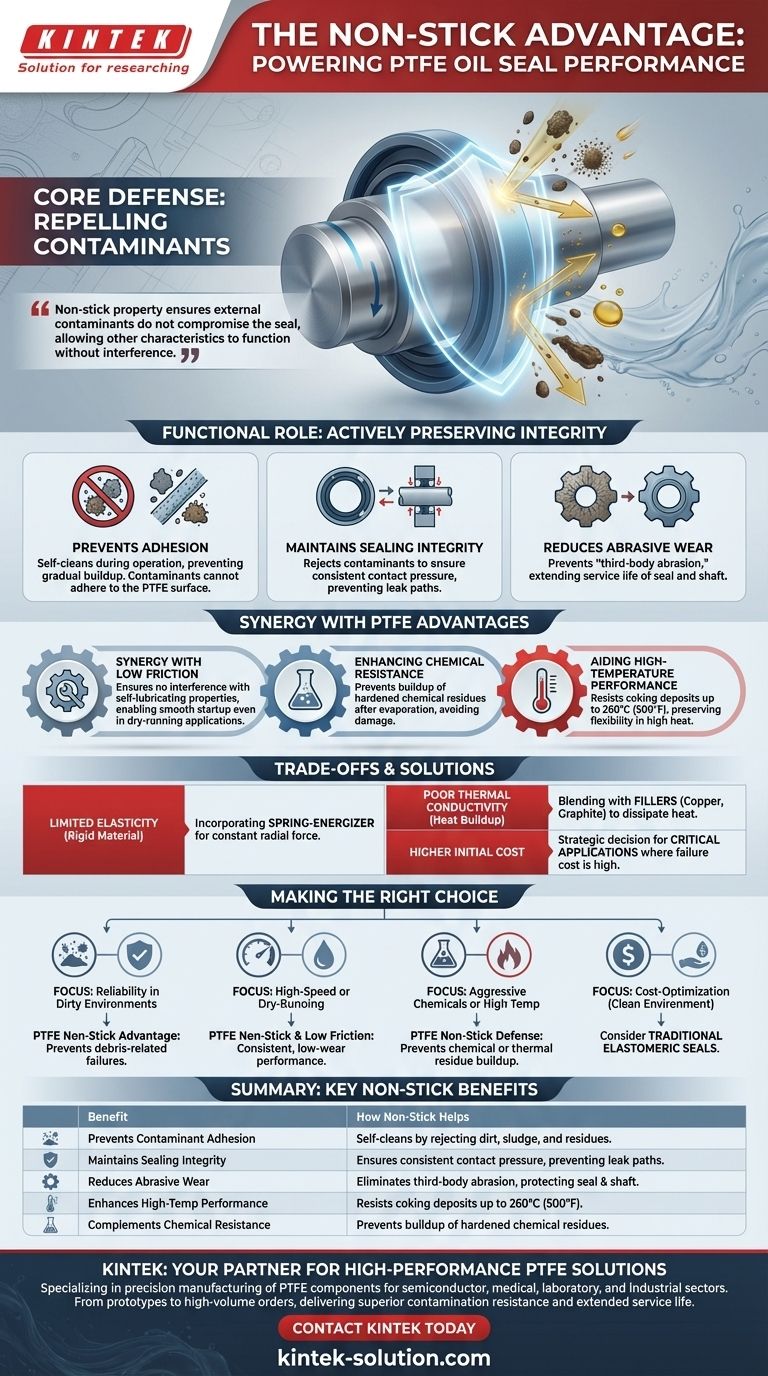At its core, the non-stick property of a PTFE oil seal is a crucial defense mechanism. This characteristic prevents contaminants like dirt, sludge, and chemical residues from adhering to the seal's surface, ensuring the sealing lip remains clean and maintains a consistent, effective contact with the shaft.
While PTFE is famous for its low friction, its non-stick surface is the key to its long-term reliability. This property ensures that external contaminants do not compromise the seal, allowing its other high-performance characteristics to function without interference.

The Functional Role of a Non-Stick Surface
To understand the value of PTFE, we must look beyond its primary function and see how its secondary properties ensure performance over time. A non-stick surface is not a passive benefit; it actively preserves the seal's integrity.
Preventing Contaminant Adhesion
The most direct benefit is preventing debris from sticking to the seal. In industrial environments, fluids are rarely pure and often contain particles or byproducts.
Because contaminants cannot adhere to the Teflon (PTFE) surface, the seal effectively self-cleans during operation, preventing the gradual buildup that can plague traditional elastomeric seals.
Maintaining Sealing Integrity
A seal fails when a gap forms between the sealing lip and the shaft. Debris accumulation is a common cause of this failure.
By rejecting contaminants, the non-stick surface ensures the sealing lip maintains its designed contact pressure and shape, preventing the formation of leak paths that would otherwise develop.
Reducing Abrasive Wear
When hard particles stick to a traditional seal lip, they can act like sandpaper, grinding against the rotating shaft. This causes scoring on the shaft and accelerates wear on the seal itself.
The non-stick nature of PTFE prevents this "third-body abrasion," significantly extending the service life of both the seal and the shaft.
How Non-Stick Properties Complement Other PTFE Advantages
The non-stick characteristic does not work in isolation. It acts as a force multiplier for PTFE's other well-known benefits, ensuring they can be realized in real-world conditions.
Synergy with Low Friction
PTFE is self-lubricating, making it ideal for high-speed, low-oil, or even dry-running applications.
The non-stick surface ensures that no external debris interferes with this inherent low friction. This is critical for equipment that may sit idle for long periods, as it guarantees a smooth, low-friction startup without stick-slip behavior.
Enhancing Chemical Resistance
PTFE is exceptionally resistant to aggressive oils, solvents, and acids. However, some aggressive chemicals can leave behind crystalline or hardened residues after evaporation.
A non-stick surface prevents these residues from building up on the seal lip, which could otherwise lead to mechanical damage or create a hardened, ineffective sealing surface.
Aiding High-Temperature Performance
PTFE seals operate effectively at temperatures up to 260°C (500°F). At these temperatures, fluids can break down and form "coking" deposits.
The non-stick surface resists the adhesion of these baked-on deposits, preserving seal flexibility and function in high-heat applications where other materials would quickly fail due to contamination.
Understanding the Trade-offs of PTFE Seals
While its properties are exceptional, PTFE is not a universal solution. Acknowledging its limitations is key to using it effectively.
Limited Elasticity
Compared to rubber, PTFE is a relatively rigid material. It has low elasticity and does not have the same "memory" or bounce-back as traditional elastomers.
This is almost always compensated for by incorporating a spring-energizer (typically a metal spring) into the seal design, which provides the constant radial force needed to maintain contact with the shaft.
Poor Thermal Conductivity
PTFE is an excellent insulator, meaning it does not dissipate frictional heat well. In very high-speed applications, this can lead to heat buildup at the sealing lip.
To mitigate this, fillers such as copper, graphite, or graphene are often blended into the PTFE material to improve its thermal conductivity and transfer heat away from the contact point.
Higher Initial Cost
PTFE seals are more expensive to manufacture than standard nitrile or Viton seals. Their use is a strategic decision.
The higher cost is typically justified for critical applications where the cost of failure—due to extreme temperatures, aggressive chemicals, or high speeds—far outweighs the initial investment in the component.
Making the Right Choice for Your Application
Selecting the correct seal material requires matching its properties to the primary challenge of the operating environment.
- If your primary focus is reliability in dirty or contaminated environments: The non-stick property of PTFE is a decisive advantage, actively preventing debris-related failures.
- If your primary focus is high-speed or dry-running capability: The combination of low friction and a non-stick surface ensures consistent, low-wear performance without requiring ideal lubrication.
- If your primary focus is managing aggressive chemicals or high temperatures: The non-stick surface provides a secondary line of defense, preventing chemical or thermal residues from compromising the seal.
- If your primary focus is cost-optimization in a clean, standard environment: A traditional elastomeric seal may be more cost-effective, as the advanced benefits of PTFE may not be necessary.
Understanding how PTFE's properties work in concert allows you to specify a seal that delivers robust performance precisely where it matters most.
Summary Table:
| Key Benefit | How Non-Stick Property Helps |
|---|---|
| Prevents Contaminant Adhesion | Self-cleans by rejecting dirt, sludge, and residues, keeping the sealing lip clean. |
| Maintains Sealing Integrity | Ensures consistent contact pressure with the shaft, preventing leak paths. |
| Reduces Abrasive Wear | Eliminates third-body abrasion, protecting both the seal and the shaft. |
| Enhances High-Temp Performance | Resists coking deposits up to 260°C (500°F), preserving seal function. |
| Complements Chemical Resistance | Prevents buildup of hardened chemical residues that could cause damage. |
Need a PTFE seal that guarantees reliability in your toughest applications?
KINTEK specializes in the precision manufacturing of high-performance PTFE components, including seals, liners, and custom labware. Our expertise ensures that the critical non-stick and low-friction properties of PTFE are optimized for your specific needs in the semiconductor, medical, laboratory, and industrial sectors.
We offer custom fabrication from prototypes to high-volume orders, delivering seals that provide superior contamination resistance, extended service life, and consistent performance in extreme conditions.
Contact KINTEK today to discuss how our PTFE solutions can solve your most challenging sealing problems.
Visual Guide

Related Products
- Custom PTFE Parts Manufacturer for Teflon Parts and PTFE Tweezers
- Custom PTFE Parts Manufacturer for Teflon Containers and Components
- Custom PTFE Sealing Tapes for Industrial and High Tech Applications
- Custom PTFE Sleeves and Hollow Rods for Advanced Applications
- Custom PTFE Square Trays for Industrial and Laboratory Use
People Also Ask
- What finishing techniques are effective for machined Teflon parts? Achieve Functional Performance and Dimensional Stability
- What challenges arise when machining PTFE (Teflon)? Overcome Softness, Heat, and Instability
- What are the unique properties of PTFE? The 3 Pillars Driving Demand for High-Performance Parts
- What fabrication services are available for PTFE? Shearing, Stamping, Laser Cutting, Molding & Machining
- What chemical processing applications involve PTFE-machined parts? Essential Components for Corrosive & High-Purity Systems



















